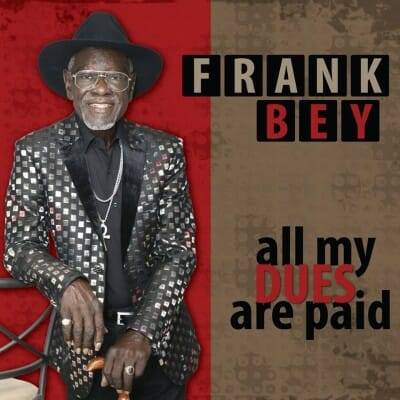Frank Bey All My Dues Are Paid
Frank Bey
All My Dues Are Paid
Nola Blue Records
Frank Bey was born in Georgia in 1946 and started singing gospel in the family band at the age of four. Being brought up in a strict household the young Bey had to sneak out of the house to sing secular music. When he was seventeen Bey took a job driving for Gene Lawson, Otis Redding’s advance man. When Redding’s opening act didn’t show Bey was asked to open. He became lead singer in a soul band but when they broke up was left stranded. Bey retired from music and opened a seafood restaurant in Philadelphia. He resumed his singing at the age of fifty but was slowed down by kidney failure. He resumed his career again eleven years later and in 2008 moved to San Francisco to work with Anthony Paule. The Bey/Paule band recorded three albums resulting in him receiving three Blues Music Award nominations. Bey’s last album “Back in Business” received two more 2019 BMA nominations.
Bey has one of the greatest voices in the soul blues genre. “All My Dues Are Paid” is Bey’s seventh recording overall and is produced by Kid Andersen, who was co-producer on the three Bey Paule albums. The album was recorded at Andersen’s Greaseland Studios in San Jose and is co-produced by Rick Estrin. The thirteen specially selected covers are played by the core band or by an expanded one featuring a full horn section. There are numerous personnel changes.
Bey opens with “Idle Hands” written by Bob Bianco and Marilyn Herscher and recorded by the Eddie Palmieri led Latin Soul Fusion band Harlem River Drive in 1971. Their bass player was Jerry Jemmott and he is playing bass here too. The other players include Jim Pugh, organ and Rhodes; Alex Pettersen, drums; Martin Winstad, percussion; Andersen, guitar, Lisa Leuschner Andersen, background vocals; and the four-piece horn section that completes the production, included are Nancy Wright and Eric Spaulding, tenor saxes; Jack Sanford, baritone sax; and John Halbleib, trumpet. Bey’s vocal highlights this civil rights lesson.
“One Of These Days” was written by William “Bill” Troiani and Haakon Hoye, whom drummer Petterson used to “run” with back in Oslo, Norway. Featured is a stripped down unit including Pettersen, Pugh on the Wurlitzer; Jemmott on bass; Andersen, guitar; and Lisa singing background on the chorus.
Bey is a great interpreter of songs. Two are from Mighty Mike Schermer. “It’s A Pleasure” features backing vocalists The Sons of The Soul Revivers: James, Walter and Dwayne Morgan; and Jemmott on bass. The other song written by Schermer is “One Thing Every Day”.
Two songs were written by co-producer Estrin. “I’ll Bet I Never Cross Your Mind” was included on Little Charlie & The Nightcats “That’s Big”, featured is Wright on saxophone, and Bey’s Louis Jordan styled vocal. “Calling All Fools” from Rick Estrin and The Nightcats 2012 album “One Wrong Turn” is given a jazzy lounge-like arrangement.
On the autobiographical title track “All My Dues Are Paid” Bey collaborated with Kathy Murray (of Kathy & The Kilowatts), Estrin and Andersen. Bey looks back on his life as he sings” they didn’t know, there ain’t no way to stop Frank Bey. It’s my time to shine”. This is Bey’s story.
Bey sings two songs from the “poet laureate of the blues” Percy Mayfield. “Never No More” is a raucous jump blues from 1962 featuring the three-piece horn section of Spaulding, Sanford, and Halblieb; Lorenzo Farrell on organ, and the rhythm section of bassist Paul Olguin and Paul Revelli, drums. “Ha, Ha in the Daytime” was first recorded in 1967 and features the lyric “Boo Hoo All Night Long” and Pugh, Andersen, Spaulding, Jemmott and Pettersen.
Also covered are Lou Reed’s 1972 avant-garde piano ballad “Perfect Day” given a gospel treatment; Country Soul pioneer Arthur Alexander’s 1993 song “If It’s Really Got To Be This Way”; Bey’s fabulous version of the George Jones standard “He Stopped Loving Her Today”; and the closer Bey’s emotional take on John Lennon’s “Imagine”.
The artistry of Frank Bey is fully realized on this well produced album. This is an award winning effort from the emotive Frank Bey.
Richard Ludmerer
Discover more from Making A Scene!
Subscribe to get the latest posts sent to your email.














































